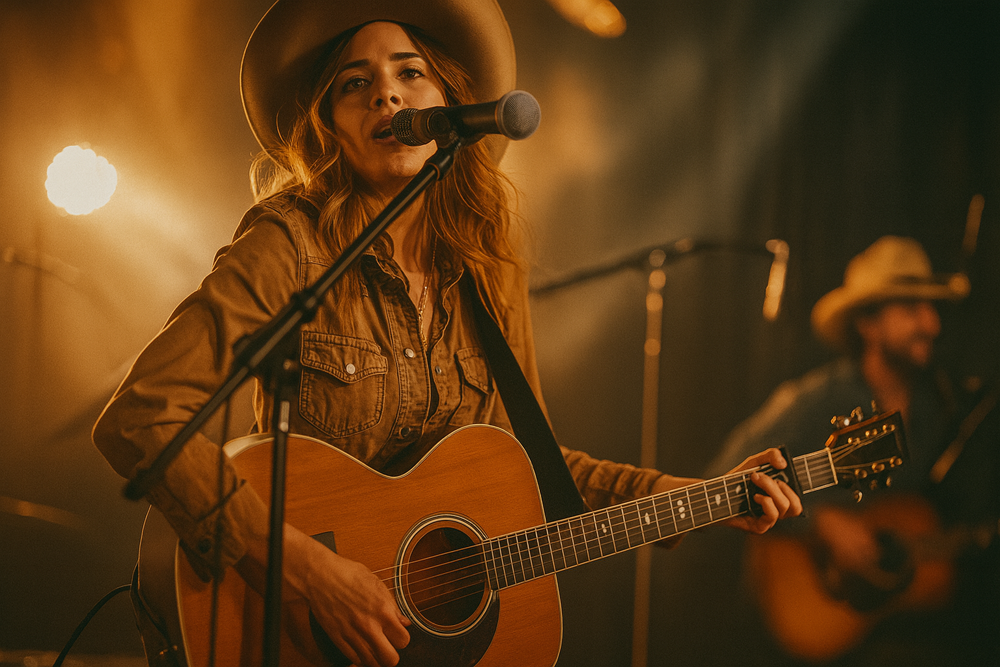You've written a great song, but will anyone else want to record it? Discover what it takes to craft songs that artists will love so much they'll be begging for permission to put a hold on your song so they can record it!
by CountryDemoStudio Staff | August, 7, 2025.

The greatest compliment any songwriter can be paid (other than receiving a Grammy or Songwriter of the Year award, of course) is when an artist will bump a song they wrote themselves from their album to record someone else's music.
Why would an artist drop their own song from their album to record yours? One of two reasons (or both): They recognize the song is a hit. They love the song and they want to be the one who sings it to the world, whether it becomes a hit or not. They see themselves in the song.
The most important thing anyone who wants to be a commercial songwriter has to realize about the songwriting business is this: Songwriters write hits. That's their job. The artist can write album tracks. Artists don't need that.
Most commonly, it's emerging artists who need solid hits to establish their careers and propel them to stardom. Similarly, established artists need hits to maintain their momentum. Make this your mantra:
🔊 Songwriters write hits.
Many songs are well-crafted, emotional, and meaningful, but that doesn't always make them recordable. If your goal is to pitch songs to recording artists, you need to think beyond personal expression and start writing with the artist's perspective in mind.
Here's how to craft songs that artists will actually want to cut—and can realistically take into the studio.
Artists are looking for songs that feel personal and authentic, even if they didn't write them. That means your song should:
📌 PRO TIP: Pro songwriters, if working with an established artist, study the artist's previous work. They'll note all their song titles. Most notably, the artist doesn't need any songs that are too similar or would compete with their biggest hits. Don't repeat what they've already done–they need something fresh.
Pro songwriters also listen to an artist's songs to map out the singer's vocal range. They want to ensure that any song they pitch to this artist will fit perfectly within the artist's vocal range and most comfortable keys.
Ensure the lyrical subject matter aligns with the artist's current image and their current age. Don't write themes that are too mature for younger artists and too young for older artists.
Your song's theme should be universal so that everyone in the listening audience can identify with its message. Great artists' songs feel personal to the listener, even if the artist didn't write them.
Universal means some incident or situation that most people have either experienced or know someone who has experienced it. This makes the song relatable and establishes a strong connection with the song's story.
Songs about love, heartbreak, growing up, or chasing dreams are timeless, but they need a unique twist to stand out.
Ask yourself:
The greatest song lyrics evoke imagery and create mental pictures for the listener. The impression the audience needs to have of the singer is a positive one. Don't write any lyrics that could potentially cast the vocalist in a bad light.
Although many genres, such as hip-hop, pop, or rock, often feature lyrics with a rebellious, bad-boy or bad-girl nature, this is not the case for country music.
Think about the most common themes in country music: Patriotism, faith, wholesome living, love, authenticity, etc.
Sure, country music has its "beer and whiskey" songs, but those themes tend to be lighthearted. They don't write songs in which the singer is a buck wild, nonstop partying, philanderer, who's only out for a good time and everything else be damned.
Don't portray female singers as vulnerable, wallowing in depression, damaged, or home wreckers.
Don't write songs about obtaining all the money, bling, and toys you can acquire, either. Don't write lyrics that brag.
Other genres may adopt some of these approaches, but country music does not.
Always make the singer look good, honorable, humble, and moral.
📌 Pro Tip: Write authentic lyrics that match the artist's established persona, or if changing style, the one they want to portray.
When choosing a song to record, artists often envision themselves singing the song on stage while listening. After all, if it's a hit, they'll be singing it for the rest of their career. Help them picture that by writing:
If it's awkward to sing, cluttered with syllables, or lacks momentum, chances are it will be rejected.
If you're writing for commercial artists, your song needs to fit the genre without sounding generic.
That means:
Don't try to write a song for "everyone." Write for a specific lane—the lane where your strengths reside—and write it better than anyone else.
For a deeper dive, check out: How to Know If a Song Is Commercially Pitchable
When you're writing for artists, your job is to serve the song and the singer. That means:
You're not trying to showcase your own artistry—you're giving someone else a canvas they can make their own.
Ultimately, artists seek songs that resonate with people, feel genuine, and align with their musical identity. If your song has emotional resonance, commercial structure, and artistic flexibility, it's one step closer to being recordable.
👉 Need help producing a song demo that artists can fall in love with?
At Country Demo Studio, we bring your songs to life with radio-ready vocals, pro musicians, and industry-aware arrangements. Scroll down to get started with your custom demo today.